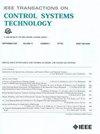利用三次样条曲线和移动地平线估计为移动机器人识别电池
IF 4.9
2区 计算机科学
Q1 AUTOMATION & CONTROL SYSTEMS
引用次数: 0
摘要
我们提出了一种跟踪移动机器人电池充电状态(SoC)的新方法,以提高其能力。电池的状态对完成任务至关重要,但有限的电池寿命可能是一个挑战。我们的方法侧重于通过系统识别和分数阶模型对电池的 SoC 进行建模和估算。这些模型非常灵活,可根据瞬态响应进行调整,从而准确估计电池特性。具体来说,我们使用三次样条插值法获得电池模型的开路电压(OCV)和不同电阻。为了估算 SoC,我们采用了一种基于移动地平线估算(MHE)算法的新方法,该算法适用于处理初始估算不佳和电池模型受限的情况。我们考虑了对放电峰值电流的限制,这可能会限制移动机器人在低电量模式下的性能。我们将系统识别和 MHE 应用于移动机器人的数据,验证了我们的方法。结果表明,尽管初始值不佳,我们的方法仍能准确估计 SoC,从而提高移动机器人的性能。本文章由计算机程序翻译,如有差异,请以英文原文为准。
Battery Identification With Cubic Spline and Moving Horizon Estimation for Mobile Robots
We propose a novel approach to track the state of charge (SoC) of batteries in mobile robots to improve their capabilities. The batteries’ status is critical to accomplish their mission, but limited battery life can be a challenge. Our methodology focuses on modeling and estimating the SoC of batteries through system identification and fractional-order models. These models are flexible and can adjust to transient responses, allowing for accurate estimation of battery characteristics. Specifically, we use cubic spline interpolation to obtain the open-circuit voltage (OCV) and the different resistors of the battery model. To estimate the SoC, we deploy a novel approach based on the moving horizon estimation (MHE) algorithm, which is suitable for handling poor initial estimation and constraints on the battery model. We consider the constraint on the peak discharging current, which can limit the performance of mobile robots in low-battery mode. We validate our approach by applying system identification and MHE to data from a mobile robot. The results show that our method accurately estimates the SoC despite poor initial values, enabling improved performance for mobile robots.
求助全文
通过发布文献求助,成功后即可免费获取论文全文。
去求助
来源期刊

IEEE Transactions on Control Systems Technology
工程技术-工程:电子与电气
CiteScore
10.70
自引率
2.10%
发文量
218
审稿时长
6.7 months
期刊介绍:
The IEEE Transactions on Control Systems Technology publishes high quality technical papers on technological advances in control engineering. The word technology is from the Greek technologia. The modern meaning is a scientific method to achieve a practical purpose. Control Systems Technology includes all aspects of control engineering needed to implement practical control systems, from analysis and design, through simulation and hardware. A primary purpose of the IEEE Transactions on Control Systems Technology is to have an archival publication which will bridge the gap between theory and practice. Papers are published in the IEEE Transactions on Control System Technology which disclose significant new knowledge, exploratory developments, or practical applications in all aspects of technology needed to implement control systems, from analysis and design through simulation, and hardware.
 求助内容:
求助内容: 应助结果提醒方式:
应助结果提醒方式:


